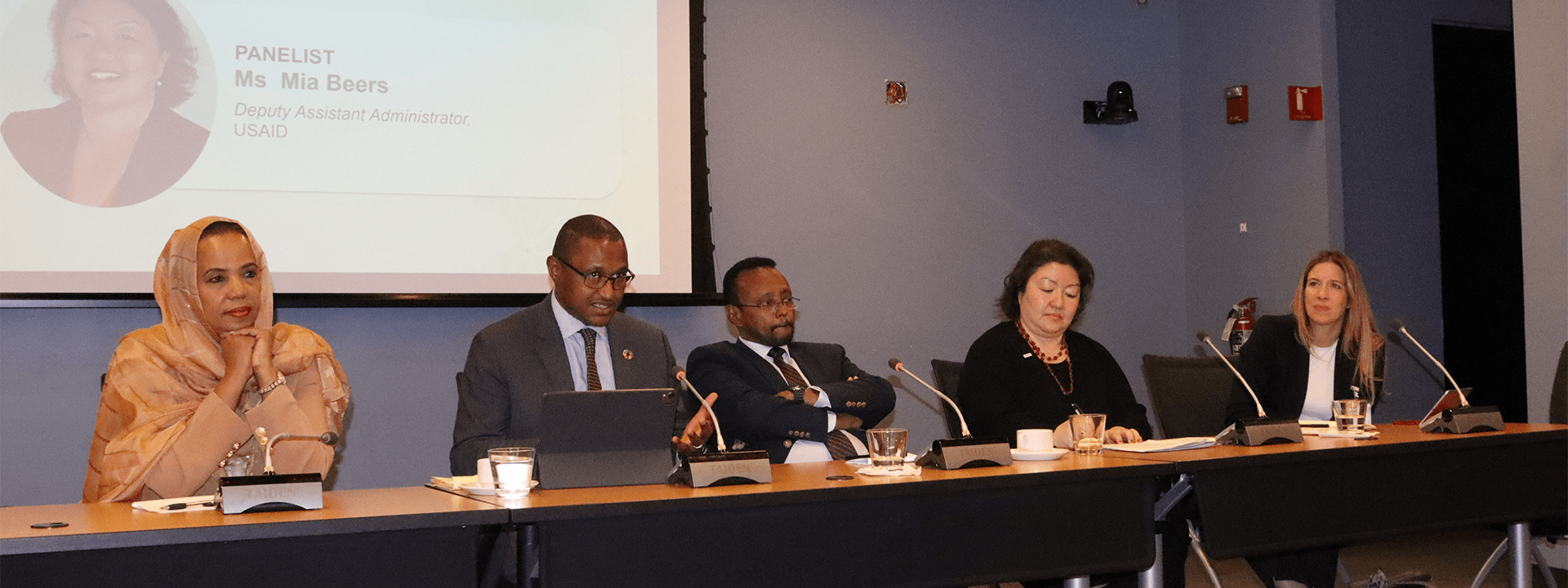March 1, 2024 (WASHINGTON, United States of America): Speakers at the high-level dialogue organized by the Intergovernmental Authority on Development (IGAD) on the sidelines of the World Bank Fragility Forum 2024 made a strong case for investment to solutions that increase resilience and adaptability to climate and conflict related vulnerabilities in the Horn of Africa.
The hybrid dialogue organized under the theme, “Resilience-building in the Horn of Africa at the intersection of climate and conflict,” was one of the key events of the March 1st, 2024 Partners Day at the World Bank complex in Washington DC, a platform designed to foster collaboration and dialogue across a range of thematic areas for stakeholders and partners to the World Bank following the 27th – 29th World Fragility Forum main event.
In a session moderated by the UNHCR Regional Director for East, Horn of Africa and Great Lakes, Mr. Mamadou Dian Balde, the Director Health and Social Development at the IGAD Secretariat, Mme Fathia Alwan, representing the IGAD Executive Director, Dr. Workney Gebeyehu stressed the need for collaboration to address the main causes of human mobility and displacement in the IGAD region being conflicts and adverse effects of climate change.
“Currently around 60 million people in the IGAD region are faced with food insecurity mainly as a result of climate change.”
Mme Fathia highlighted how in 2022 and 2023 climate change resulted in five consecutive failed rainfall seasons in many countries in the Horn of Africa while other parts of the Horn experienced flooding. This, she said, was happening in a region that hosts close to 25 million displaced people comprising of over 19 million IDPs and 5 million refugees.
“The effects of climate change across the region, including its contribution to disaster risk, are resulting in new patterns of human mobility and displacement within countries and across national borders.”
Appearing on the subsequent panel discussion which featured a wide range of topics, Mia Beers, the Deputy Assistant Administrator for the United States Agency for International Development (USAID) said the Agency had developed shock response monitoring systems to track the results of interventions and measure success in resilience programming in the Horn of Africa.
She highlighted a number of success stories as a result of these interventions including timely response to shocks which has been important to saving lives and livelihoods.
“Disaster response time in some IGAD Member States has been reduced from as much as 180 days in the drought of 2011 in the Horn to about 21 days in the recent crises in 2022 and 2023,” Mia said.
The World Bank Group’s Global Crisis Risk Platform Lead, Mr. Lindsey Paul Jones acknowledged that while the Horn of Africa is highly vulnerable to climatic shocks, the amount of climate financing going into the region is much lower than adaptation and mitigation financing and called for efforts to address the mismatch.
Kate Montgomery from Investment Fund, Acumen Capital Partners shared about how the Fund had developed products for financing companies and solutions working in the forced displacement space in the East and Horn of Africa and called for the full implementation of the IGAD Kampala Declaration on Jobs, Livelihoods and Self-Reliance of Refugees, Returnees and Host Communities to expediate private sector investments in displacement settings.
Dr. Guleid A. Artan, the Director, IGAD-Climate Prediction and Application Centre (ICPAC) established that climate prediction technologies were making a difference in offering timely information against disasters.
“Our commitment to climate prediction is grounded on the belief that informed decision making is the cornerstone of resilience by leveraging cutting edge technology, data driven insights and promoting regional cooperation,” said Dr. Artan.
The side event was attended by a cross-section of stakeholders including government representatives, international organisations, civil society, academia and the private sector.
According to the World Bank Information note, The Fragility Forum is a biennial event that brings together policymakers and practitioners from humanitarian, development, peace and security communities; public and private sector; academia; and civil society. The objective is to exchange innovative ideas and knowledge to improve development approaches in fragile, conflict and violence-affected (FCV) settings to foster peace and stability.
The Fragility Forum 2024 was organized under the theme “Adapting and Innovating in a Volatile World,” with sessions curated around four sub-themes; Learning from our experiences in Fragility, conflict, and violence (FCV), fostering resilience in complex risk environments, addressing FCV in Middle income countries and the private sector in FCV.

